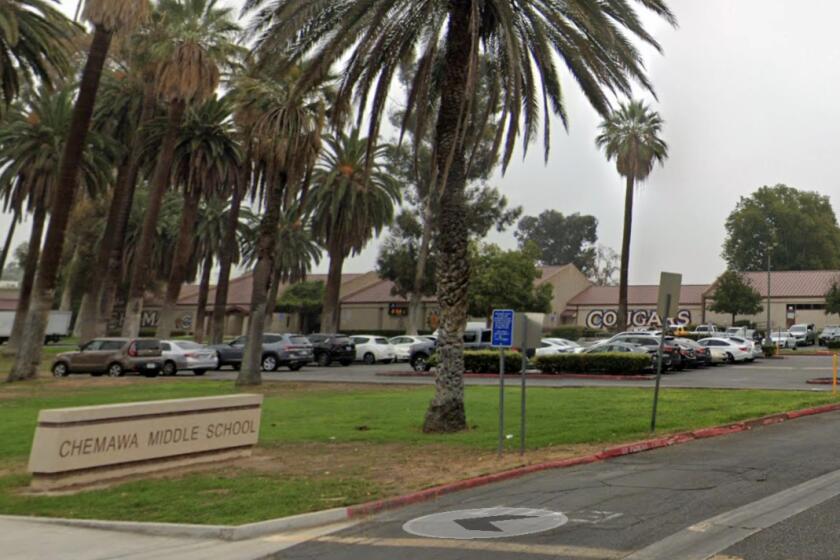Ambition, Flaws Mix at University
The unfolding liver transplant scandal at UCI Medical Center raised questions Thursday about whether systemic shortcomings are to blame for the institution’s continued problems as it tries to climb to the top tier of medical research universities.
In the past 10 years, even as its prestige has grown, UCI’s medical programs have suffered a series of setbacks, including the illegal sale of cadaver parts by its Willed Body Program and the prosecution of fertility doctors who stole eggs and embryos and implanted them in other women.
Three previous investigations called for stronger administrative controls over UCI’s health programs.
On Thursday, University officials denied widespread problems, saying each controversy was separate. “The issues have always been unrelated to each other,” UC Irvine spokesman Tom Vasich said, adding that the past problems have been “absolutely resolved.”
The university shut down its fertility clinic in 1995 after doctors stole eggs and embryos and transplanted them in other patients.
The following year, an audit of five medical school departments, not initiated by any controversy, stressed that oversight was a major problem at UCI.
The report found that the medical school could attract physicians and grow into a premier research institution because it gave researchers independence. However, that growth and autonomy came at the expense of “sound management controls and internal control procedures in some areas.”
Poor oversight also was blamed in 1997, when cancer researchers improperly charged patients for experimental treatments, and again the next year, when a professor used patients’ blood samples for research without seeking permission.
But problems continued to arise.
In 1999, the director of the school’s Willed Body Program was accused of selling body parts to an Arizona research program, improperly soliciting cash donations, performing unauthorized autopsies and misappropriating funds.
The school formed a panel of outside experts to offer recommendations.
Their findings: The medical school should hire more administrators and persuade faculty to devote more attention to policing and paperwork.
They also said the UCI medical program raises unique administrative challenges because the medical school is in Irvine and the hospital is in Orange, 14 miles away.
After similar problems emerged in UCLA’s willed-body program in 2004, systemwide procedures were put in place, and the UC system president’s office took over management of those programs at the five UC campuses with medical centers.
UCI Medical Center shut down its liver transplant program Thursday, after the federal government pulled its certification. The move came the same day The Times reported more than 30 people died waiting for transplants while the hospital turned down available organs.
UCI’s chancellor, Dr. Michael V. Drake, declined an interview request Thursday, but in a statement e-mailed to students and faculty, he announced that he would appoint a committee to investigate.
“I want to state unequivocally, however, that providing the best possible patient care at UCI Medical Center and our other clinics in Orange County remains a top priority,” he wrote.
Despite the problems, enrollment and research funding at UCI continue to grow at record-setting paces -- as does the school’s reputation. In 2004, researcher Irwin Rose shared in a Nobel Prize for chemistry, and this year, behavioral scientist R. Duncan Luce was awarded the National Medal of Science, the highest scientific honor in the U.S.
For the fourth year in a row, UCI won more research grants than ever, totaling $236 million, including the three largest grants in its history awarded to the medical school, Vasich said.
Scandals occurred because the school pushed too hard, too fast, some say. UCI launched high-profile and lucrative programs, only to watch them suffer serious setbacks or closure.
Former Chancellor Ralph J. Cicerone, who left UCI in June to become president of the National Academy of Sciences, said he did not recall any red flags with the transplant program.
“After those events which brought all the bad reputation on the place, we couldn’t afford to make mistakes,” he said. “I spent a lot of time and developed a great deal of confidence not only in the current leadership but in the staff as well.
“I don’t think it’s malfeasance of any kind.”
Michael Shapiro, an ethicist and law professor at USC, said it appeared that UCI Medical Center stopped the transplant program without telling patients.
“If I were the principals at UCI, I would be very afraid,” Shapiro said. “This is a lot worse than what happened in the fertility scandal.... If you decided you’re going to turn down dozens of livers, you tell the patients so they can go someplace else.”
If proved, such allegations can destroy a hospital’s reputation, said Dr. James Trotter, medical director of liver transplantation at the University of Colorado in Denver.
“It can be devastating if it becomes apparent that they’re mishandling organs and causing patients to die,” Trotter said.
Bioethicist Arthur L. Caplan, director of the Center for Bioethics at the University of Pennsylvania School of Medicine, said medical centers such as UCI’s, with dreams of having a top-ranked medical school and hospital, can sometimes misstep.
“Ambition is a good thing, but it can be a virtue that can quickly become a vice because it’s hard to manage growth,” Caplan said. “And if you’re doing things like not telling transplant patients that you’re turning away livers, you’ve definitely slipped to the darker side of ambition.”
*
Times staff writer Claire Luna contributed to this report.
*
BEGIN TEXT OF INFOBOX
UC Irvine’s medical program
Notable controversies in the last decade:
1995: In May, UC Irvine accuses Ricardo H. Asch, Jose P. Balmaceda and Sergio C. Stone, a team of fertility doctors at its Center for Reproductive Health, of transplanting patients’ eggs without consent, conducting human subject research without permission and prescribing a fertility drug not approved by the government.
Result: The Center for Reproductive Health is closed in 1995. The federal government charges Asch and Balmaceda with mail fraud and conspiracy to defraud patients of their genetic material. Asch flees to Argentina and Balmaceda to Mexico. Stone remains in the U.S. and is convicted of fraudulently billing insurance companies, and receives one year of detention and a $50,000 fine.
1997: After the Food and Drug Administration launches an inquiry, UCI finds that a research lab at its Chao cancer center in 1995 and 1996 violated university and federal regulations by charging patients and Medicare for experimental drugs without authorization and soliciting donations from patients trying to get into clinical trials.
Result: The lab closes in 1996. The head researcher, Dr. John Hiserodt, resigns from the university in 1997.
1998: Dr. Darryl See resigns after UCI says he violated research procedures by using patients’ blood samples for research without their authorization and using inappropriate procedures on laboratory animals.
1999-2000: The university finds that Christopher Brown, director of the medical school’s Willed Body Program, has sold parts of cadavers, misappropriated money, conducted unauthorized autopsies, improperly solicited cash donations for the program and overcharged travel costs.
Result: Brown is fired; no criminal charges are filed. The Willed Body Program is now managed by the UC Office of the President.
2004: UCI officials say a cancer researcher, Dr. Hoda Anton-Culver, misspent as much as $2.3 million in state and federal funds on unauthorized software instead of cancer research, for which the money was intended.
Current status: The allegations are still under review. Anton-Culver has continued to work on several projects for the medical department, including a cancer surveillance network.
Source: Times reports
More to Read
Sign up for Essential California
The most important California stories and recommendations in your inbox every morning.
You may occasionally receive promotional content from the Los Angeles Times.











